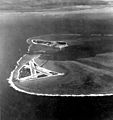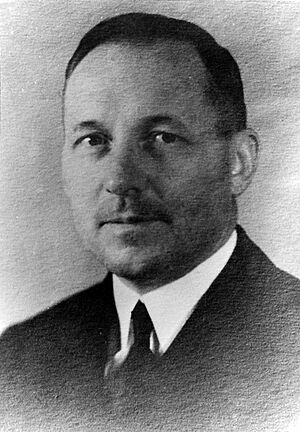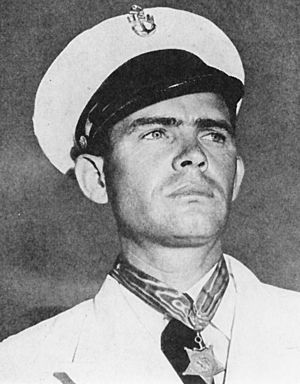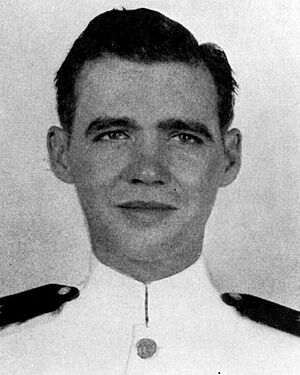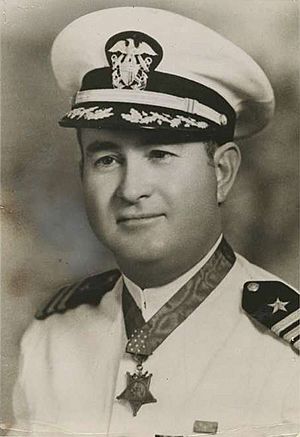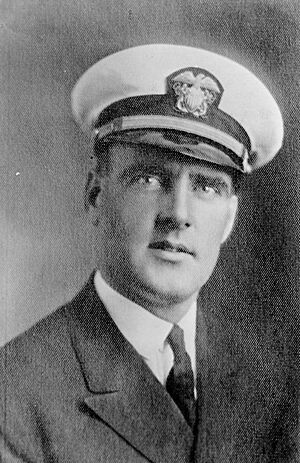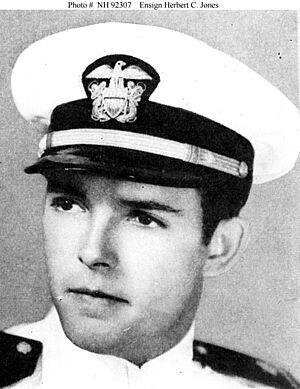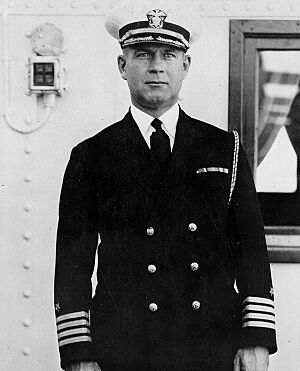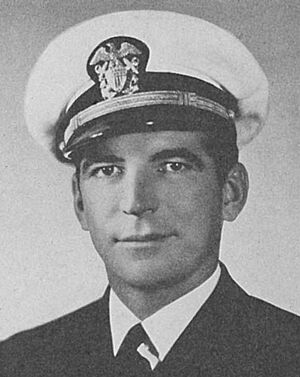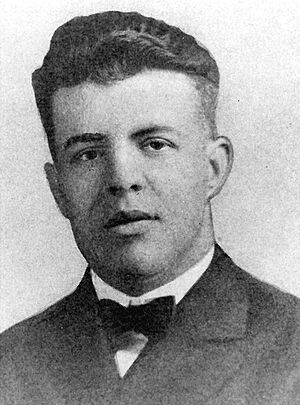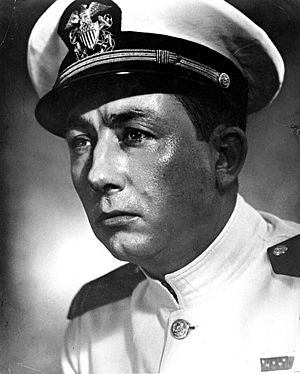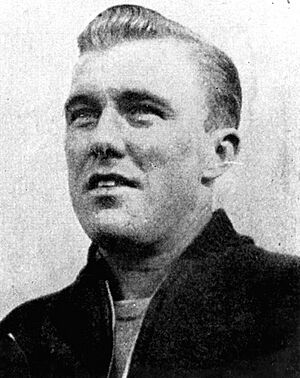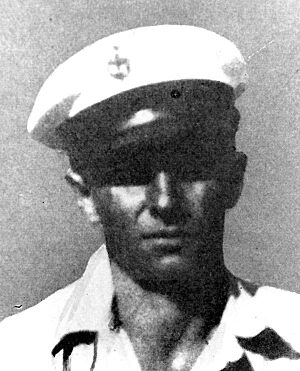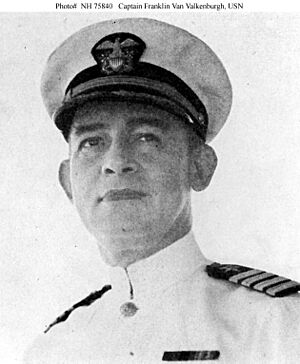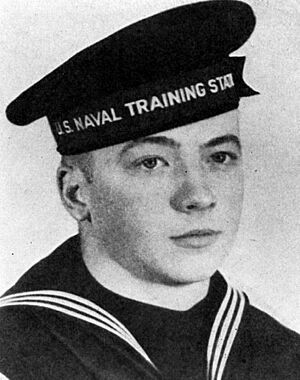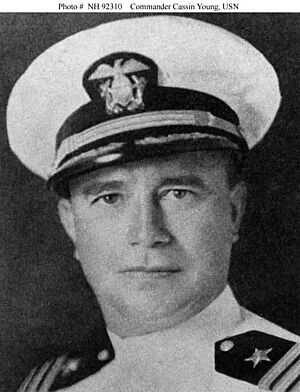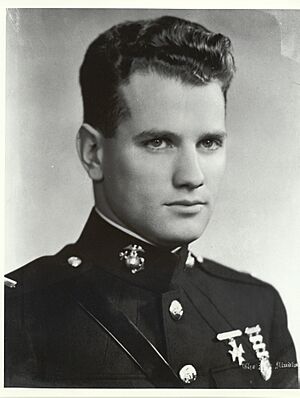List of Medal of Honor recipients for the Attack on Pearl Harbor facts for kids
The Medal of Honor is the highest award for bravery a person in the United States military can receive. It's given for incredible acts of courage. The attack on Pearl Harbor was a sudden military strike by the Imperial Japanese Navy against the United States. This attack happened on December 7, 1941, at Pearl Harbor in Hawaii. Japan targeted many U.S. military places, especially the naval base.
This surprise attack killed nearly 2,500 people. It also badly damaged the U.S. Navy's ships and airfields. This event made the United States join World War II. For their amazing bravery during the attack, 15 sailors and 1 Marine were given the Medal of Honor. These 16 heroes held different ranks, from seaman to rear admiral. Eleven of them received their awards after they had died, which is called posthumously.
Contents
Where Heroes Fought: Pearl Harbor Locations
Many brave actions happened at different places during the attack. Four sailors from the USS California earned Medals of Honor. Three were from the USS Arizona. Two each came from the USS Nevada and the USS Oklahoma. One hero was from the USS Utah, one from USS Vestal, and one from the USS West Virginia. There was also a sailor at Naval Air Station Kaneohe Bay and a Marine at Naval Air Station Midway.
Brave Actions: Medal of Honor Recipients
This color means the Medal of Honor was given after the person had died.
| Image | Name | Service | Rank | Ship / Unit | Place of action | What They Did |
|---|---|---|---|---|---|---|
| Mervyn S. Bennion | Navy | Captain | USS West Virginia | Pearl Harbor, Oahu, Territory of Hawaii | Even though he was badly wounded, he stayed in charge of the USS West Virginia. He showed amazing courage and didn't think about his own safety. | |
| John W. Finn | Navy | Chief Aviation Ordnanceman | Patrol Bombing Squadron 11 | Naval Air Station Kaneohe Bay, Oahu, Territory of Hawaii | At NAS Kaneohe Bay, he bravely used a machine gun against Japanese planes. He kept fighting even after being wounded many times, causing a lot of damage to the enemy. | |
| Francis C. Flaherty | Navy | Ensign | USS Oklahoma | Pearl Harbor | As the USS Oklahoma was sinking, he stayed in a gun turret. He held a flashlight so others could see and escape, giving up his own life to help them. | |
| Samuel G. Fuqua | Navy | Lieutenant Commander | USS Arizona | Pearl Harbor | He was hurt when the USS Arizona was first bombed. But he recovered and calmly led efforts to put out fires and rescue wounded sailors. His leadership saved many lives. | |
| Edwin J. Hill | Navy | Chief Boatswain | USS Nevada | Pearl Harbor | During heavy bombing of the USS Nevada, he led his crew to release the ship's ropes and swam back to the ship. He was killed by an explosion while trying to drop the anchors. | |
| Herbert C. Jones | Navy | Ensign | USS California | Pearl Harbor | He organized a team to bring ammunition to the anti-aircraft guns of the USS California. He was fatally wounded by a bomb. He told others to leave him and save themselves. | |
| Isaac C. Kidd | Navy | Rear Admiral | Battleship Division One | Pearl Harbor | He stayed on the bridge of the USS Arizona doing his duty. He was killed when a bomb hit the bridge as the ship exploded. | |
| Jackson C. Pharris | Navy | Gunner | USS California | Pearl Harbor | He was in charge of repairs on the USS California. Despite severe injuries and being knocked out twice, he helped supply ammunition, fixed the ship's tilt, and rescued unconscious shipmates from flooded areas. | |
| Thomas James Reeves | Navy | Chief Radioman | USS California | Pearl Harbor | After the ammunition lifts on the USS California stopped working, he helped pass ammunition by hand through a burning hallway. He died from smoke and fire. | |
| Donald K. Ross | Navy | Chief Machinist | USS Nevada | Pearl Harbor | He made his crew leave a dangerous engine room on the USS Nevada and did all the work himself until he passed out. After waking up, he went back to work until ordered to leave. | |
| Robert R. Scott | Navy | Machinist's Mate First Class | USS California | Pearl Harbor | When his battle station on the USS California flooded, he refused to leave. He said he would stay and keep the air compressor working for the guns as long as they were firing. | |
| Peter Tomich | Navy | Chief Watertender | USS Utah | Pearl Harbor | Even though he knew the USS Utah was turning over, he stayed at his post. He made sure all boilers were shut down and all crew members had left before he did. | |
| Franklin Van Valkenburgh | Navy | Captain | USS Arizona | Pearl Harbor | He remained on the bridge of the USS Arizona doing his duty as the ship's commander. He was killed when a bomb hit the bridge as the ship exploded. | |
| James R. Ward | Navy | Seaman First Class | USS Oklahoma | Pearl Harbor | During the evacuation of the USS Oklahoma, he stayed in a gun turret. He held a flashlight so others could see and escape, giving up his own life to help them. | |
| Cassin Young | Navy | Commander | USS Vestal | Pearl Harbor | He moved his ship, USS Vestal, away from the burning battleship USS Arizona. He then beached his ship on purpose to save it from sinking. |
Midway Atoll: Another Hero's Story
The Japanese fleet that attacked Pearl Harbor also struck other places in the Hawaiian Islands that day. They tried to disable the U.S. Marine base on Sand Island at Midway Atoll. For his actions during this fight, a 16th Medal of Honor was given to a Marine. He died at Sand Island on this first day of the Pacific War.
This color means the Medal of Honor was given after the person had died.
| Image | Name | Service | Rank | Ship / Unit | Place of action | What They Did |
|---|---|---|---|---|---|---|
| George H. Cannon | Marine Corps | First Lieutenant | 6th Defense Battalion | Naval Air Station Midway, Sand Island, Midway Atoll, Territory of Hawaii | He refused to leave his post until his men, who were wounded by the same shell that hurt him, were safely evacuated. He kept directing his command post until he was forced to leave. |
See also
- Francis P. Hammerberg - a Navy Medal of Honor recipient who died in rescue operations at Pearl Harbor in February 1945.











